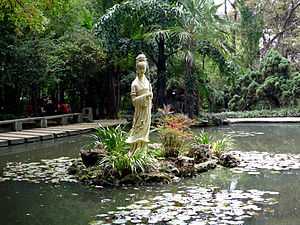Chen Yuanyuan

Chen Yuanyuan (traditional Chinese: 陳圓圓; simplified Chinese: 陈圆圆; pinyin: Chén Yuányuán; Wade–Giles: Ch'en Yüan-yüan; 1624–1681), born Xing Yuan (C: 邢 沅, P: Xíng Yuán, W: Hsing Yüan),[1] lived near the end of the Ming Dynasty, and was a concubine of Wu Sangui. Her courtesy name was Wanfen (Chinese: 畹芬; pinyin: Wǎnfēn; Wade–Giles: Wan-fen). Her actual historical significance is disputed, although it is largely believed that Chen was pivotal in Wu Sangui's campaigns after the fall of the Ming.[2] She was one of the Eight Beauties of Qinhuai (秦淮八艳).
History
Chen Yuanyuan was born to a peasant family, and on the death of her father, she became a courtesan. Due to her beauty and singing ability, she became a lead figure in opera in Suzhou.[3] Fearing for her life due to an abduction attempt, she became the concubine of Mao Xiang.

In 1642, Chen was abducted by the Tian Hongyu family where she became the singing courtesan. She then moved into the possession of Wu Sangui, though how is unclear - she may have been purchased by Wu's father[3] or given as a gift by Tian.[1]
In April 1644, Beijing fell to a rebel army led by Li Zicheng. Chongzhen gathered the entire imperial household and ordered them, except for his sons, to commit suicide. The Empress hanged herself. Princess Changping refused. In a fit of rage Chongzhen had her left arm cut off. He then fled to nearby Jingshan Park(景山公園), where he hanged himself on the famous Guilty Chinese Scholartree (罪槐). Chen Yuanyuan reluctantly assisted by helping him up to the noose, according to some accounts.
Li established what he called the Shun Dynasty, but it fell to the Manchus at the end of May. Seizing their chance, the Manchus crossed the Great Wall after Wu Sangui opened the gates at Shanhai Pass. They quickly overthrew Li, who fled the Forbidden City.
After he defeated remnant forces consisting of Ming loyalists in southwestern China, Wu was rewarded with the title of Pingxi Wang (平西王; translated as "Prince Who Pacifies the West" or "King Who Pacifies the West") with a fief in Yunnan by the Qing imperial court. Wu took Chen Yuanyuan with him to Kunming.
Wu Sangui later died during a rebellion against the Qing, and his successor Wu Shifan committed suicide after being besieged by the Qing army, Wu Shifan's wife and Chen committed suicide together.[3]
Popular culture
Appearance in drama
The best-known literary account of the legend of Chen Yuanyuan is the "Yuanyuan qu" (Song of Chen Yuanyuan) by Wu Weiye (1609–72).
Fiction
- The Deer and the Cauldron (鹿鼎記): a wuxia novel by Louis Cha. In the story, Chen YuanYuan was the mother of A'ke (阿珂) – the most beautiful of the seven wives of the protagonist Wei Xiaobao.
See also
References
- ↑ 1.0 1.1 Notable Women of China: Shang Dynasty to the Early Twentieth Century. East Gate. 2000. pp. 330–334. ISBN 0-7656-0504-X.
- ↑ The Cambridge History of Chinese Literature, Volume 2. Cambridge University Press. 2010. p. 179. ISBN 978-0-521-85559-4.
- ↑ 3.0 3.1 3.2 Biographical dictionary of Chinese women. East Gate. 1998. pp. 21–26. ISBN 0-7656-0043-9.